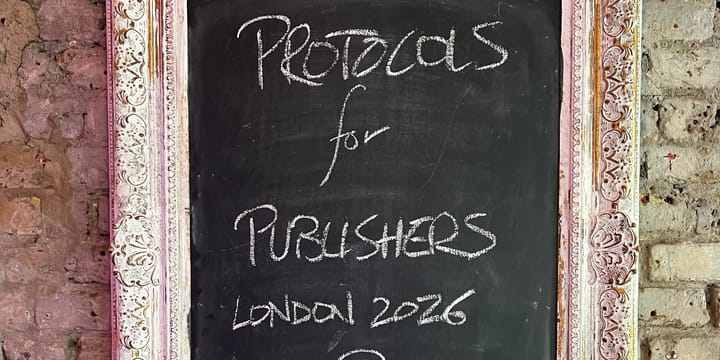'Composable Moderation' May Protect Bluesky from Political Pressure
Composable moderation decentralizes rule-setting, reducing pressure on any single platform and limiting attempts to “work the refs.”

By Audrey Hingle. This piece is co-published with Tech Policy Press.
The Trump administration, led by a President who was previously banned from major social networks for inciting violence and spreading disinformation after the 2020 US election, poses a particular challenge for the upstart platform Bluesky. As Erin Kissane noted in a recent article in Tech Policy Press, Bluesky was designed for openness and interoperability, yet it now finds itself as a single point of pressure. If it enforces its rules against harassment and incitement against official Trump administration accounts for some future infraction, it risks political retaliation. If it weakens its rules or shies away from enforcement, it may lose the trust of the communities who turned to the network for protection from coordinated abuse.
Composable moderation, which decentralizes rule-setting by letting users pick the moderation services that best reflect their needs and values, mitigates this problem. It shifts enforcement away from a single platform and into a distributed ecosystem of user-selected moderation services. With no central referee to target, political actors and influencers lose the ability to “work the refs” and pressure a singular trust and safety team into making decisions that favor their side.
Spreading the burden of moderation
“Bluesky the app” is the company’s shorthand for distinguishing its consumer-facing social app from the AT Protocol, the decentralized social networking protocol it is building. The app is just one client in what is intended to become a broader ecosystem of services built on the protocol. For now, however, Bluesky the company still carries the full responsibility for moderation and governance across the AT Protocol.
Centralized governance of a decentralized protocol cannot withstand sustained political or social pressure. When one company sets moderation rules for a network that is meant to be open and distributed, it becomes a single point of influence that governments, interest groups and powerful users can target. As AT Protocol’s Ethos statement makes clear, its long-term vision sits at the intersection of three movements: the early web’s open publishing model, the peer-to-peer push for self-certifying and decentralized data, and the large-scale distributed systems that underpin modern internet services.
Bluesky’s goal is for AT Protocol to embody the openness of the web, the user-control of peer-to-peer networks, and the performance of modern platforms. In the future, we could see photo-sharing apps, community forums, research tools and more all using the same identities and social graph. Bluesky is only one expression of the protocol, not the limit of it.
Composable moderation is the feature that will make that possible. Rather than treating moderation as a network-wide ban, it uses labels to describe issues with content or accounts, leaving individual apps to decide how to act on them. Following a letter from Daphne Keller, Martin Husovec, and my colleague Mallory Knodel, Bluesky has committed to this approach.
Instead of blocking someone in a way that removes them from every app built on the protocol, Bluesky will mark a suspended account with a label that only affects how that account appears inside Bluesky. Other apps can choose to hide the account, show it with a warning, or ignore the label entirely. This also keeps the user’s underlying account intact, because it’s stored on their personal data server or PDS, the place where their identity and posts live, which should only cut someone off for serious issues like illegal content. The result is a more flexible, decentralized system where no single app controls whether someone exists on the network.
Why this approach solves the potential Trump problem
The closest analogy to existing social media is to how Reddit operates: the platform sets a baseline of what is acceptable, but thousands of subreddit communities apply their own rules, filters, and enforcement styles on top. For example, r/AskHistorians expects in-depth, well-sourced answers that reflect current academic research, and moderators routinely remove unsourced or speculative replies that don’t meet that standard. Composable moderation takes that layered, community-defined model and implements it at the protocol level, so many different apps and services can choose the moderation approaches that fit their values.
And because moderation could be provided by many different apps and services, not just Bluesky, it would reduce the political vulnerability that comes from having a single company responsible for every enforcement call. Communities can also choose moderation services that reflect their own context and needs, giving vulnerable groups more control over the protections they rely on. And if one app or operator fails or comes under political pressure, others can continue enforcing their own standards without breaking the network.
Taken together, this shift could help Bluesky, and future AT Protocol services, navigate the pressures Kissane highlights, distributing power across the network rather than concentrating it in a single company.
Support the Exchange Point — Your Donation Helps Us Build a Feminist Future
If you love our work and want to power more of it, here are the ways to support EXP and our projects:
🔐 Protect digital rights with a tax-deductible donation. Give directly through PayPal (tax deductible in the U.S.). ➡️ https://exchangepoint.tech/donations
🌱 Double your impact with employer matching. Most tech companies match donations through Benevity — search “Exchange Point.” Here are three projects to support with matching donations: ➡️ Social Web ➡️ Human Rights and Standards ➡️ Protect E2EE
📅 Sustain the movement with a large or recurring monthly gift. Become a monthly supporter and help us plan long-term. ➡️ Please email grants@exchangepoint.tech.
🛠️ Fund the work through contracts or sponsored projects. Partner with us on research, workshops, audits, or ecosystem strategy. ➡️ Work with us!
🩵 Support our sister effort on the Free Our Feeds campaign. Chip in through the FOF community GoFundMe. ➡️ https://gofund.me/1ef4d5d5d
Thank you for helping us build an open, joyful, people-powered internet.
Want to sponsor a future newsletter?
This Week's Links
Open Social Web
- Bluesky will now tell you what rule you broke when it suspends your account, an intervention that Prosocial Design Network says is likely to reduce repeated rule-breaking. https://techcrunch.com/2025/11/19/bluesky-announces-moderation-changes-focused-on-better-tracking-improved-transparency
- Mastodon unveiled a new leadership team and detailed its transition to a European non-profit structure. https://blog.joinmastodon.org/2025/11/the-future-is-ours-to-build-together
- ICYMI: Jack Dorsey funds Evan Henshaw-Plath’s diVine, a Vine reboot that includes Vine’s video archive, is built using a decentralised open source protocol, and will be banning AI created videos. https://techcrunch.com/2025/11/12/jack-dorsey-funds-divine-a-vine-reboot-that-includes-vines-video-archive
Internet Governance
- The Internet still depends on fragile paperwork to prove who controls an IP address. The Internet Society explores how a new tool, the RPKI Signed Checklist, can use cryptographic proof to replace these weak systems and make routing more secure. https://www.arin.net/blog/2025/11/19/2024-grant-report-isoc
- The Australian government said young children will be banned from social media on December 10th as scheduled despite a rights advocacy group on Wednesday challenging the legislation in court. https://apnews.com/article/australia-children-social-media-ban-court-challenge-5c85493f58c2869505431f101af17f35
Digital Rights
- Apple and Google’s Play stores shape what apps are available to most people as they use the Internet. When those app stores block or limit apps based on government requests, they are shaping what people can do, say, communicate, and experience, says ACLU’s Daniel Kahn Gillmor. https://www.aclu.org/news/free-speech/app-store-oligopoly
- The US Border Patrol is monitoring millions of American drivers nationwide in a secretive program to identify and detain people whose travel patterns it deems suspicious, The Associated Press has found. https://apnews.com/article/immigration-border-patrol-surveillance-drivers-ice-trump-9f5d05469ce8c629d6fecf32d32098cd
- The Mexican government lifted its long-standing block on accessing its main website over the Tor network in July 2025, partially reversing years of restrictions while leaving some sites still inaccessible. https://blog.torproject.org/mexican-government-partially-unblocks-tor
- Thirty-six digital rights and consumer groups are urging the FTC to investigate and halt Meta’s plan to use private AI-chatbot conversations for advertising, warning it violates privacy. https://democraticmedia.org/publishings/ftc-group-letter-call-for-ftc-oversight-investigation-and-suspension-of-meta-s-ai-chatbot-advertising-practice
- ICYMI: The UK government is embracing facial recognition with the Home Office and Immigration Enforcement planning a proof of concept at ports for immigration enforcement. https://www.biometricupdate.com/202511/uk-home-office-live-facial-recognition-adoption-begins-with-poc-at-ports
- The news follows a recently released policy paper on the UK Government’s Immigration Enforcement facial recognition policy: https://www.gov.uk/government/publications/immigration-enforcement-facial-recognition-policy
Technology for Society
- A new UN Human Rights report outlines how investors can use their financial leverage to push the AI ecosystem toward stronger data agency, responsible governance, and rights-respecting innovation. https://www.ohchr.org/en/documents/tools-and-resources/investors-financing-ai-ecosystem-roles-and-leverage-drive-responsible
- This study investigates the role of encrypted messaging apps, specifically WhatsApp, in disseminating political disinformation during South Africa’s 2024 general elections. https://journals.sagepub.com/doi/10.1177/19401612251395434
- CDT has developed prototypes of different types of deterrence messaging that could reduce the demand for Non-consensual distribution of intimate images through search. https://cdt.org/insights/think-twice-before-you-search-deterrence-messaging-designs-to-prevent-searches-for-non-consensual-intimate-images
- A new CDT report examines how teens and parents actually experience popular social-media safety proposals, revealing a consistent gap between policy ideas and real user needs. https://cdt.org/insights/what-kids-and-parents-want-policy-insights-for-social-media-safety-features
- Podcast: American Prestige. Silicon Valley and the Israeli Occupation, featuring Omar Zahzah, Assistant Professor of Arab Muslim Ethnicities and Diasporas Studies at San Francisco State University, discussing his book Terms of Servitude: Zionism, Silicon Valley, and Digital Settler Colonialism. https://americanprestigepod.com/episodes/4215556855
- Airbnb.org is offering emergency housing to families displaced by disasters, and any donation made before 31 December will be matched to double the number of nights provided. https://www.airbnb.org/giftanight
Privacy and Security
- Pornhub’s parent company urged Apple, Google, and Microsoft to support device-based age verification in their app stores and across their operating systems. https://www.wired.com/story/pornhub-is-urging-tech-giants-to-enact-device-based-age-verification
Upcoming Events
- The Trump Effect on Digital Resilience in the Global Majority from the Global Network for Social Justice & Digital Resilience. 2pm-3.30pm UTC. December 3. Online. https://digitalresilience.network/register-for-our-public-webinar-pulse-2025-the-trump-effect-on-digital-resilience-in-the-global-majority
- How the Internet actually works and policy implications for the future. This interactive and practical session will demystify the inner workings of the Internet. 10am CET. December 4. Strasbourg, France and Online. https://www.europarl.europa.eu/thinktank/en/events/details/how-the-internet-actually-works-and-poli/20251118WKS06601
- Cables of Resistance - movement conference against Big Tech. April 10-12. Berlin, DE. https://programm.infraunited.org/cableresist26/cfp
Careers and Funding Opportunities
- Internet Society: Chief of Staff to the CEO. Washington DC, Remote. https://internetsociety.bamboohr.com/careers/313
- Sovereign Tech Agency: Programs Director. Berlin, DE. Flexible/Hybrid/Remote. https://www.sovereign.tech/jobs/programs-director
Opportunities to Get Involved
- The Arab Center for Social Media Development (ACSD) is pleased to announce the opening of proposals for workshops and sessions at the Palestine Digital Activism Forum 2026, Forms are due December 15. https://pdaf.net/invitation




Comments ()